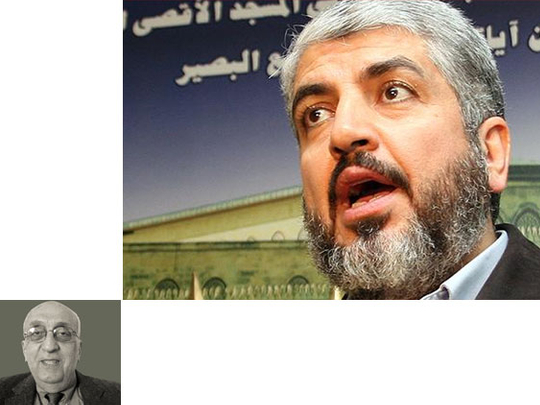
The re-election of Khalid Mesha’al, the “relative pragmatist” leader of the Gaza-based Palestinian faction Hamas, is very likely to raise hope that the two most prominent Palestinian political groups may shortly join forces, now that the chances of peace talks between the Palestinians and the Israelis could be at their doorstep.
The recent visit of US President Barack Obama to Israel, the Occupied Territories and Jordan, and the follow-up talks that the US Secretary of State, John Kerry, had with Palestinian President Mahmoud Abbas and Israeli Prime Minister Benjamin Netanyahu added more wood to the slow fire.
Mesha’al’s re-election by his group’s ruling 60-member Shura Council may be the signal that the extremist elements within his group have been defeated since he has for a long time dealt with Abbas. The Hamas leader also has the backing of several regional countries including Qatar, Iran, Turkey, Egypt, Jordan and Syria, although his group left Damascus soon after the start of the bloody civil war there. It had reportedly refused to re-establish itself in the Syrian capital.
“I do not say Europe is going to open up to Hamas tomorrow,” Reuters quoted an unidentified diplomat as saying. But, he added, a “real engagement with the West” was possible if Mesha’al persuaded Islamist colleagues to change their policies.
Palestinian political analyst Hani Al Masri was also quoted as saying Mesha’al’s re-election signalled that Hamas was showing a desire for more moderation in order to build bridges with the West, but “it did not mean that Mesha’al was a man who raises a white flag”.
The first step that Mesha’al would need to take is to reconcile his group with Fatah, the Palestinian group led by Abbas and which controls the West Bank-based Palestine Liberation Organisation. As a matter of fact, both Abbas and Mesha’al had indeed reached a deal last year whereby Abbas would head a government of technocrats in the West Bank and Gaza. The projected government would then be tasked with paving the way for general elections.
However, opposition leaders in the Hamas-controlled Gaza Strip were against the deal because they were reportedly fearful that a unity agreement would give Abbas a new foothold in Gaza and weaken Hamas’ grip on the strategic Palestinian coastal strip, which is virtually besieged nowadays by Israel. The southern border of the Strip, where some 1.5 million Palestinians live, is shared with Egypt, now run by an Islamist government.
Qatar last week proposed a conference in Cairo to work out a reconciliation agreement among the two factions but Abbas, who indicated he was willing to attend, suggested that the two Palestinian groups can immediately form a new cabinet since he and Mesha’al had been in touch regularly.
However, the more serious obstacle is still the position of western nations, especially the US, and Israel whose rejectionist record in this respect is shameful. Israel ought to remember that Mesha’al had on September 25, 1997, survived in Amman, an assassination attempt carried out by the Israeli secret service, Mossad, under orders from Netanyahu and his security cabinet. Likewise, Hamas founder, Shaikh Ahmad Yassin, was assassinated by Israel in 2004 — a development that led to Mesha’al assuming the leadership of Hamas.
Moreover, various Israeli governments have included political leaders and parties that have refused to accept the Palestinians in their midst. Netanyahu undoubtedly recalls what his Likud Party says in its political platform: “Settlement [colonisation] of the [Palestinian] land is a clear expression of the unassailable right of the Jewish people to the Land of Israel and constitutes as an important asset in the defence of the vital interests of the State of Israel.”
Furthermore, his party’s platform declares unabashedly that “the Jewish communities in Judea, Samaria and Gaza are the realisation of Zionist values”.
Naftali Bennett, the Israeli Minister of Economy, openly advocates the outright annexation of nearly 60 per cent of the West Bank (Area C) and does not believe that peace is possible. Netanyahu’s former foreign minister, Avigdor Lieberman, who is now facing “corruption charges,” will assume the same position when and if he is acquitted. Lieberman lives in an Israeli colony in the West Bank.
Unlike these Israeli officials, Mesha’al, is on record saying that he could accept a Palestinian state alongside Israel.
What more does Israel — or the US — want to launch the peace talks?
George S.Hishmeh is a Washington-based columnist. He can be contacted at ghishmeh@gulfnews.com.












